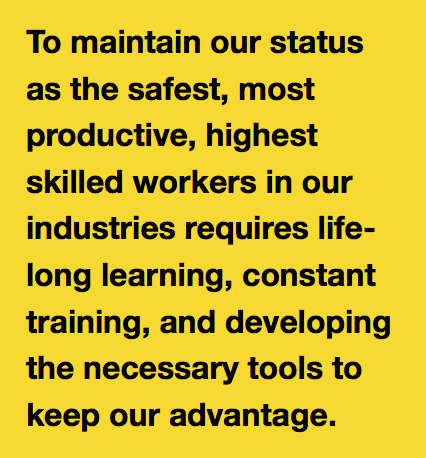Our Toolbox for Contract Negotiations Works!
Union representation and strong UWUA contracts are what separates us from workers who have no voice and very few rights at work.
With our contract, we cannot be fired at the whim of management, and our wages, benefits, working conditions, and more, are all protected. This gives us peace of mind. Imagine going to work every day without the protections your contract provides.
We should not take what we’ve won in our contract for granted. In most cases it’s taken many years, and numerous contract negotiations — sometimes we had to go on strike — to win these benefits. We can never forget the sacrifices that workers have made for others to benefit.
Adapt to survive and grow
To protect what we have and build for the future, we must always look to improve ourselves, each other, and our union.
 Our success depends on our ability to adapt. To maintain our status as the safest, most productive, highest skilled workers in our industries requires lifelong learning, constant training, and developing the necessary tools to keep our advantage.
Our success depends on our ability to adapt. To maintain our status as the safest, most productive, highest skilled workers in our industries requires lifelong learning, constant training, and developing the necessary tools to keep our advantage.
Negotiating good contracts and enforcing them is the foundation of our success. At the National Union our job is to support the work of the locals, particularly around contract bargaining and enforcement. We are also very strongly focused on providing training to develop the necessary skills so our members are the best in our industries.
Members have the opportunity to improve their bargaining skills and learn what works best in their industry at our Regional Conferences. It’s great to see hundreds of utility workers participating in them this year.
In order to succeed, we need to bring a lot of special tools to the bargaining table that are shaped to make meeting our contract demands possible while, at the same time, laying the groundwork for the future.
For example, as health insurance premiums rise, companies continually try to shift more of the costs onto our members. That’s why we established the UWUA National Health & Welfare Fund. In most cases, through this multi-employer benefit fund we are able to offer lower-cost healthcare, vision, dental, life and other insurance benefits coverage. It is a tool to use at the bargaining table that should not be left in your toolbox.
Another tool the National Union has created is the UWUA Power for America Training Trust. Many of our employers understand the role training plays in remaining competitive and are joining P4A to make that happen. The number of incumbent workers going through safety and skills training continues to climb. New members, too, are graduating from our courses in record numbers.
Training opens doors
To meet the demand for P4A services, East Coast Project Coordinator Priscilla Peloubet has joined the growing P4A team. She is working closely with National Safety Director Scotty MacNeill on the Peer-to-Peer (P2P) Safety Committee Certification Training Program. In addition, she is building out two registered apprenticeship programs in collaboration with the DOL and state apprenticeship offices.
Our training successes are opening doors into new, growing industries. Offshore wind is one of them. As we move into the wind industry, we are developing training curriculum and positioning ourselves to be recognized by the industry to manage training programs for union members with National Grid, Eversource, and Consolidated Edison.
One of the things we are most proud of is our Utility Workers Military Assistance Program (UMAP). Our first UMAP program was at Local 18007 in Chicago, started by Business Manager Rick Passarelli. UMAP-Chicago is a defined training to placement program specifically for military veterans. Our second UMAP program was started in Michigan several years after the Chicago program. UMAP-MI was developed for Michigan military veterans, reservists and members of the National Guard.
These programs — the Regional Conferences, the Health & Welfare Fund, P4A and UMAP — are just some of the tools we’ve created to address the needs of our members. They were won through collective bargaining and collective action. You don’t have to wait until contract time to take advantage of them. If you want to find out more, contact the National Union’s office.

